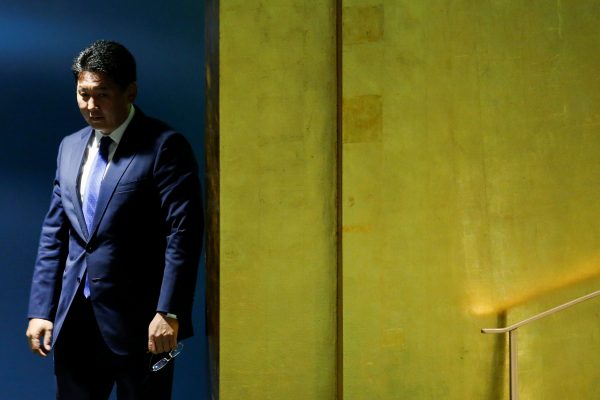If a shift to cleaner technologies as part of Mongolia’s Vision 2050 involves leveraging its uranium endowment towards producing nuclear energy, Ulaanbaatar appears to be facing a difficult choice between either Russia or China for developmental expertise.
The potential for China, in particular, to step up Mongolia’s development of a domestic nuclear industry comes at a time when China is expanding its nuclear weapons arsenal near the China–Mongolia border.
In July 2021, analysts revealed that China appears to be constructing approximately 250 nuclear silos in Western China, including in Xinjiang, Gansu and Inner Mongolia. These silos are in close proximity to some of the richest uranium deposits in the world on the Mongolian side of the border. Independent experts suggest that this project could represent the biggest expansion of China’s nuclear arsenal yet.
The largest nuclear expansion since the Cold War harks back to the peak of Sino-Soviet tensions, when China allegedly deployed 60,000–75,000 Chinese troops and nuclear warheads to Mongolia. After the Cold War, eager that this may never happen again, Ulaanbataar unilaterally declared itself a Nuclear Weapons Free Zone (NWFZ) at the United Nations.
Now, with severe air quality issues plaguing the capital due to coal and wood burning, and as the country focuses attention on climate targets and maintaining energy security, domestic debate is ramping up over the potential for nuclear technology, and for China to assist in the development of uranium mines and fission plants.
In 2011, Tsogtshaikhan Gombo, deputy chairman of state-owned uranium mining company MonAtom, announced that Mongolia aims to have its first nuclear power plant running by 2020.
This never materialised but, in his previous role as prime minister, Khurelsukh was keen to progress the construction of nuclear power plants. In 2019 an informal understanding was reached with the then Russian prime minister Dmitry Medvedev that Russia would help facilitate its development.
An agreement was also reached between the state-owned Russian atomic energy corporation Rosatom and the Nuclear Energy Commission of Mongolia to build a centre for nuclear capacity-building in 2018, although development has not yet begun. The International Atomic Energy Agency also sent a mission to Mongolia to share tips on sound nuclear management. This was followed by recent statements from Dr. Teghsbayar, a member of MonAtom, that Mongolia possesses the uranium reserves required for mining and exporting, but also for producing nuclear energy.
Now, increasingly close ties with Beijing may mean Mongolia could instead turn to China to develop its nuclear industry. Khurelsukh’s Mongolian People’s Party has been accused of heavy militarisation supported and funded by China.
Mongolia’s dismal financial position means the country is unlikely to build nuclear power plants over the next decade, let alone develop uranium mining sites, without significant outside assistance.
Considering pledges made at COP26 and the trend in funding away from fossil fuels, global powers appear increasingly interested in opportunities to invest in the development of nuclear capability with international partners as a bilateral bargaining chip — particularly border countries rich in uranium.
Khurelsukh has to position himself strategically for difficult decisions ahead — balancing Mongolia’s developmental interests without undermining the nation’s values in the global non-proliferation of nuclear weapons.
Dimitris Symeonidis is an independent energy policy and geopolitical risk analyst based in The Hague.

